Talks on India-UK trade deal reach ‘advanced stage’, raises hopes on both sides

NEW DELHI: Talks between India and the United Kingdom on a trade deal have reached an “advanced stage” as negotiators have significantly narrowed differences on key issues while a few unresolved matters will require a political nod, four officials aware of the developments said on Friday.
Among the issues on which the two sides have narrowed divergences are business mobility, Scotch whisky and automobiles, increasing hopes for a breakthrough within the next two weeks, the officials said on condition of anonymity.
India’s key ask for liberalising business mobility for short duration deployment of professionals is only to facilitate trade between the two countries, particularly in services, and it is in no way related to the larger issue of immigration, which is not even part of the free trade agreement (FTA), they said.
“It seems the UK has nearly agreed to grant access to Indian professionals for business-related visits on a reciprocal basis. Modalities are being discussed between the two sides,” one official said. The negotiators – under the direct guidance of commerce secretary-level officials – are currently holding talks in New Delhi.
With the UK reluctant to go beyond the current level of 100,000 work visas issued to Indians annually, the Indian side suggested as a compromise that the number could be increased while reducing the duration of visas.
Replying to a specific question on the possibility of concluding the FTA by the end of this month, commerce secretary Sunil Barthwal said on Friday that talks are at an “advanced stage” and “negotiations are going on, so we should wait” till the talks are over.
Barthwal travelled to London last week to give a boost to the talks and his UK counterpart was in New Delhi this week for the same purpose. It is now widely expected that UK Prime Minister Rishi Sunak may visit India from October 28 to endorse an agreement, if the negotiations covering 26 chapters are concluded, a second official said.
The officials said a few unresolved issues require a political nod. “A majority of the chapters are either closed or are at advanced stage of negotiation. High level engagements at various levels are ongoing to iron out differences,” a third official said.
Among issues that remain to be addressed are inter-company movement of workers, rules of origin and greater access to Indian markets for British dairy products and electric vehicles.
HT reported on October 9 that a planned visit by Sunak to India this month is being linked to positive outcomes in the negotiations on the FTA. Indian and British negotiators are currently continuing the 13th round of talks that began on September 18.
According to a report by Politico, British officials will brief Sunak on the outlines of the FTA next week “as he makes a final call on whether to seal the coveted pact in New Delhi” later this month. The report quoted an unnamed senior UK official as saying that negotiations were in the “final stages”.
“If they can conclude a deal it obviously makes sense that he’d go,” the UK official told Politico, referring to Sunak’s planned trip.
Mobility, automobiles and whisky had been some of the vexed issues, but it seems a win-win situation has emerged after intense negotiations, the third official said. HT reported on October 3 that Indian industries were unwilling to offer import duty concessions to British manufacturers without London allowing easier mobility for Indian professionals.
If business mobility – or easier temporary movement of Indian professionals to the UK for business purposes – is taken out of the negotiations, there won’t be any significant gain for India as most Indian goods (more than 60% of total merchandise) already have duty-free access to the UK market, and most other items attract a low tariff of 5%.
According to an information note from the UK’s Department for International Trade, the simple average tariff on goods imported into Britain from India is 4.2%, compared to 14.6% simple average tariff on British exports to India. “The majority of product lines (66%) on Indian exports to the UK face no tariffs. In comparison, only 3% of product lines on UK exports to India can enter tariff free,” it said.
Besides, India has a very high import duty on automobiles (100%) and whisky (150%). Indian industry has expressed willingness to substantially reduce tariffs in automobiles and whisky provided there are similar concessions in business mobility, the three officials cited above said.
The two sides have also reached understanding on provisions related to labour standards and rights and sustainable business as these are not binding or legally enforceable, a fourth official said.
However, the window for striking a trade deal is narrowing as both India and the UK are set to hold a general election next year. The two countries have already missed a deadline for finalising the FTA by Diwali in 2022.
culled from Hindustan Times

